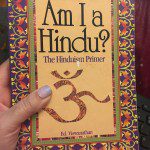I was sent this book, Post Traumatic Church Syndrome, as part of Patheos’s book club. I actually requested it because I remember reading some of the blog that it was based on and loving the concept. The title is also fantastic. Really hits the lubricated nail on the head.
The basic idea is that Reba grew up in a very religious Pentacostal family (a branch of Christianity) and when she lost her childhood faith it was very crushing. On her 29th birthday she gets the radical idea to try to heal her spiritual hurt by visiting 30 religions before her 30th birthday.
I’ll admit that I went into the book ready to find fault. It’s one of my baser qualities, but I have a tendency to get very envious of people with book deals and it makes me skeptical of memoirs. I’m always ready to criticize. However, in this case I was immediately surprised by how much I liked the book and how very strongly I relate to it!
It has forced me to face some truths that I’ve been hiding even from myself. The fact is that I have minimized the role that Christianity has had in my life.
Post Traumatic Church Disorder is a really perfect description for an experience that hits close to home for me. She talks about how when she goes to church as an adult all she feels is loss. That’s what I feel too. With no good reason, really. But it is an overwhelmingly strong emotion. I feel the loss of the life I expected for myself, the path and trajectory that I had been set on. Even though it was something within me that could no longer accept Christian teachings, I feel angry at the church for me having that awakening. There’s a part of me that still longs to run back to the comfort of childhood faith and I’m angry that it no longer exists for me, there is no where to run back to.
I should be able to feel God where ever I go, and yet I feel a strong aversion to churches. I haven’t been able to appreciate their beauty or their calm or go to services and be thinking of Shiva in my heart. I feel like I should be able to do that, but everything in me resists stepping across the threshold into a church.
When I was a kid I was deeply Christian. I’ve always been a religious person. The way I looked at it then was that Truth could be accessed in any religion and mine happened to be Christianity. So I devoted myself to that while still having respect for other paths and other religions. Jesus felt like a close personal friend and mentor. When home Internet became common I was often online reading about Christian head covering, modesty, courtship, homeschooling, and anti-feminism. I planned to be the perfect submissive Christian housewife. My faith was the center of my life.
And then it was taken away from me. It wasn’t really an outside force but an internal one that tore me off that path and put me on a better one, a healthier and happier one. Even though I’m in a better place now, deep in my heart my inner child is still mourning the loss of that life I had planned.
Hinduism is never a serious consideration for Reba. She goes to a Diwali celebration and has a good time. She spends time with Hare Krishnas. It’s interesting for her but it’s too foreign from her experience to truely connect with. And that’s fine. I appreciate that she put Hinduism on her list. For me Hinduism was a very natural fit because it had familiar elements from my childhood without the baggage.
I’m sure that many born-Hindus have the kind of baggage with Hinduism that I have with Christianity. It can be a very rough transition between the innocent and full faith of a child into the more complex and challenging faith of an adult.
Reba has a tenacity that I really admire. She sticks with things when they are tough and that’s something that I’ve never managed to do. Over and over she finds that when she sticks with something through the really difficult parts at the other side she gains a lot from the experience. For example, she tries fasting. It gets super, super hard. I could see the point at which I definitely would have given up. But she pushes through it and has a valuable experience because of that. I’m sure that same quality makes her very good at her job as a salesperson.
Same thing with meditation. I’m jealous of her meditation. She describes how difficult it is at first. Terribly, terribly hard work. Frustrating work. But then she does get the rhythm of it and starts having transcending experiences. The only time I’ve ever had a transcendent experience meditating was in Chennai when it felt like my mantra was outside me, being sung around me. Not really like the energy that she feels. Like my husband and cousin, Reba can feel the energy that I can’t at all.
My criticisms are not really criticisms. I would like to know more about The Breaking, the events that caused her loss of faith. And I’m saddened that Reba felt such a strong desire to hide the health problems she was having. As a disability rights activist it breaks my heart when I hear of people trying to hide and minimize what they are experiencing. Hiding debilitating illness contributes to a society that sees disability as very “other”, different, and scary.
And yes, she does deal with someone accusing her of spiritual tourism.
The structure of the book matches a lot with its theme. It doesn’t divide up into neat little categories. When I first got the book I went to the table of contents thinking that I’d see the complete list of the 30 religions (and denominations). A chapter for Judaism, a chapter for Buddhism, etc. But that’s not how it was at all. She is telling the story of finding hope and faith again and as she tells that story she brings in elements from her various experiences at different religious services. It flows really well and isn’t choppy the way it would be if she divided up each religious service into its own chapter.
I think this book is a great answer to the criticisms of Eat, Pray, Love (with which I don’t really agree). You can have a huge spiritual journey without leaving your home area.
This book is well written, a touch humorous, and deeply honest. It’s very impressive how honest Reba is able to be, putting her soul onto the page. I’m happy for her that she overcame her symptoms of post traumatic church syndrome. I’m a little jealous too! I would like to be able to put the baggage I have with Christianity behind me and I really don’t know if that’s possible or not.
There’s a lot of wonderful insights in this book and I highly recommend it.












